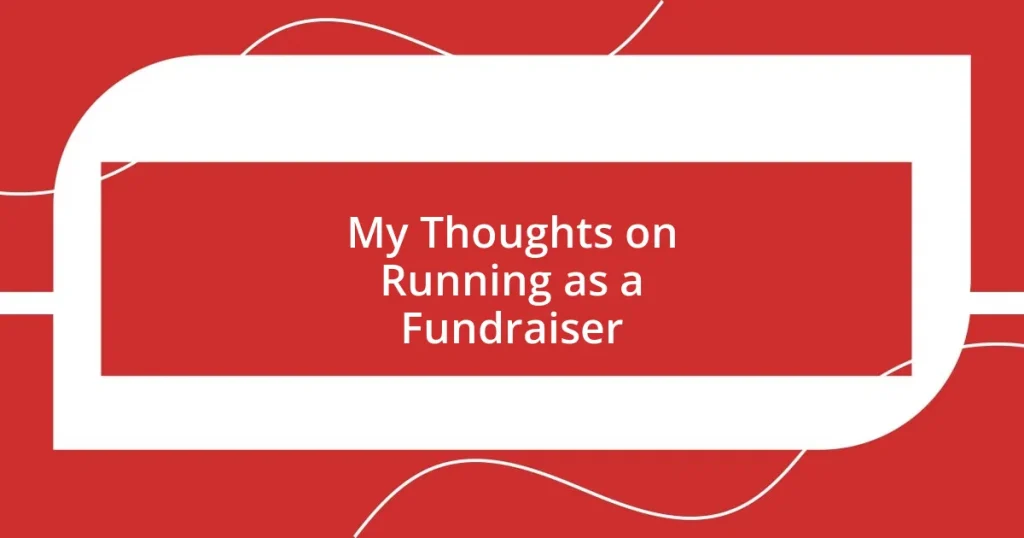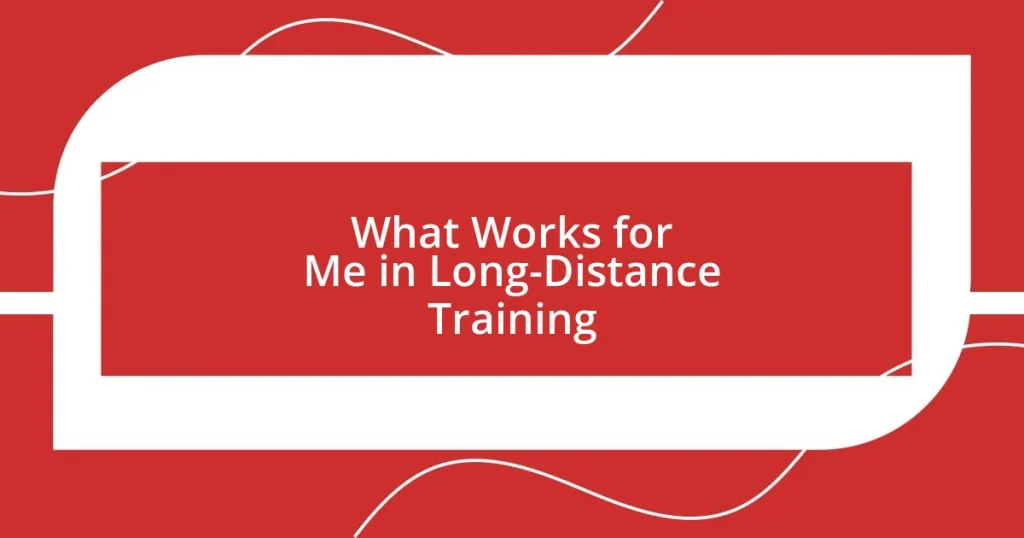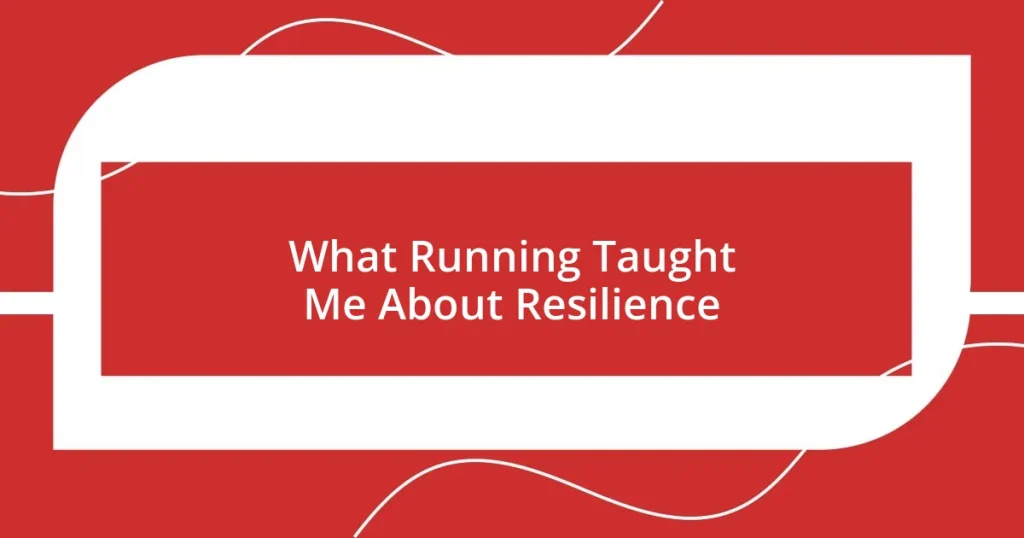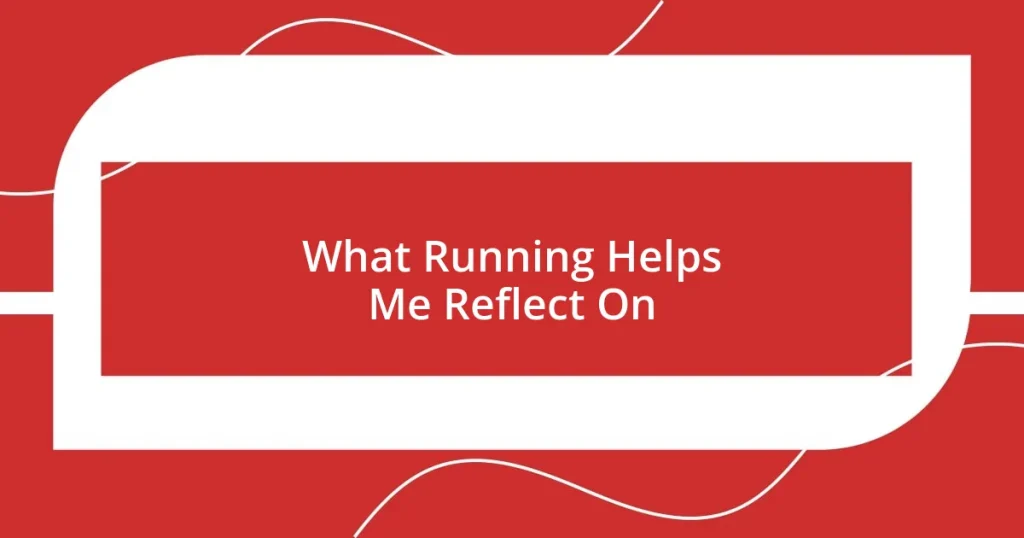Key takeaways:
- Running for charity fosters community and personal connections, motivating individuals to raise funds for causes they believe in.
- Setting clear, achievable fundraising goals and breaking them into smaller milestones enhances motivation and accountability.
- Engaging the community through storytelling and social media amplifies support and encourages participation.
- Celebrating successes and sharing beneficiaries’ stories reinforces the impact of fundraising efforts and strengthens community bonds.
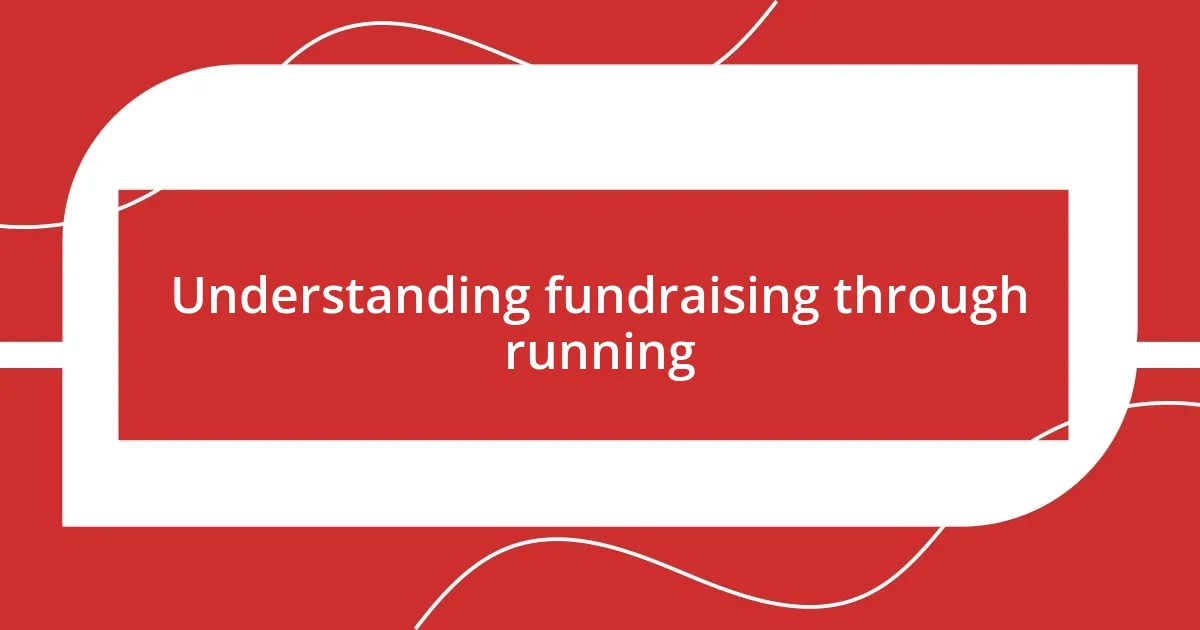
Understanding fundraising through running
Running as a fundraising tool is more than just lacing up your shoes and hitting the pavement; it’s about creating a connection. I remember my first charity run—it wasn’t just the thrill of crossing the finish line that made it memorable but the camaraderie with fellow runners and the shared purpose we had in supporting a cause we all believed in. Isn’t it incredible how a simple act of running can unite people for a greater good?
Every mile I ran felt like a step closer to making a difference. The emotional high was profound, especially when I saw the funds pouring in, knowing they would help children in need. It prompted me to ask myself: what drives people to not only run but also raise funds? For many, it’s a personal story that fuels their passion—maybe a loved one impacted by the cause they’re supporting.
Moreover, running as a fundraiser teaches resilience and commitment. The training itself wasn’t always easy; I faced fatigue and setbacks, but those challenges mirrored the very struggles the beneficiaries faced every day. This connection made each run feel purposeful and underscored the importance of perseverance—not just in running, but in life itself. Isn’t it fascinating how our personal journeys can intertwine with the larger narrative of giving?
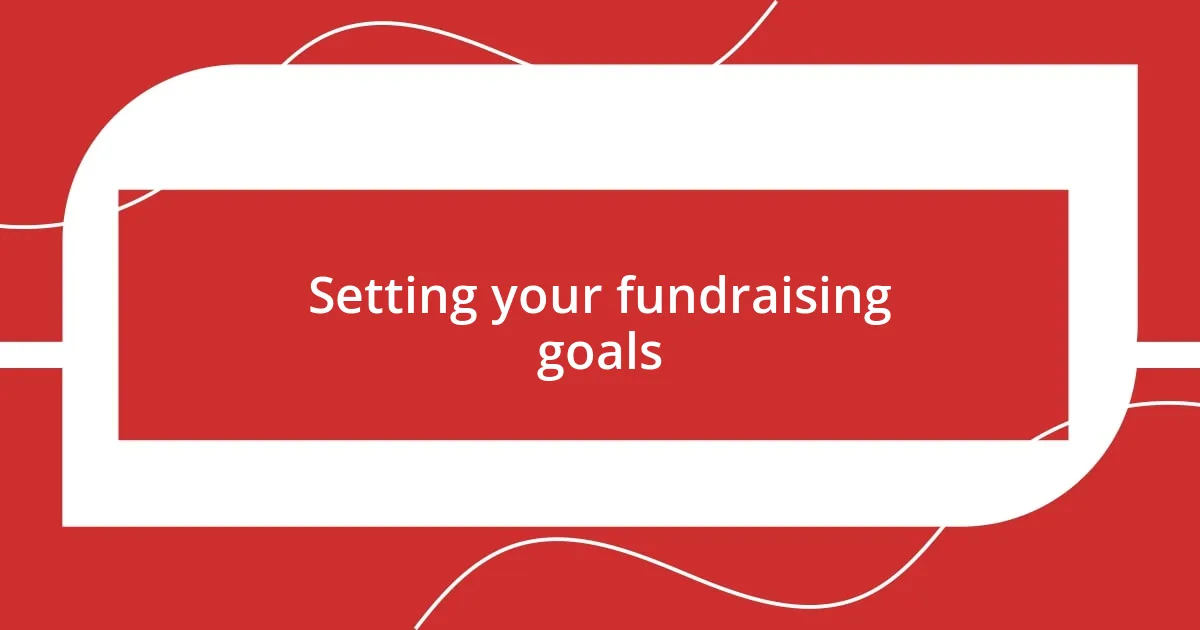
Setting your fundraising goals
Setting your fundraising goals is essential for success in any charity run. I’ve found that when I set clear, achievable objectives, it motivates me to share my journey with potential donors. Having a specific dollar amount in mind not only helps measure progress but gives a sense of purpose. When I ran my first marathon as a fundraiser, my goal was to raise $1,000. I broke it down into smaller, manageable targets—$100 a week—making it feel less daunting.
Here are some key points to consider when setting your fundraising goals:
- Align with Your Cause: Choose a goal that reflects the needs of the organization you’re supporting.
- Be Realistic: Start with a number that challenges you but is attainable based on your network and resources.
- Create Milestones: Set smaller goals along the way to maintain momentum and celebrate progress.
- Share Your Goals: Be vocal about your objectives; it creates accountability and encourages donations.
- Reassess and Adjust: Don’t hesitate to modify your goals as you gather more support or face challenges.
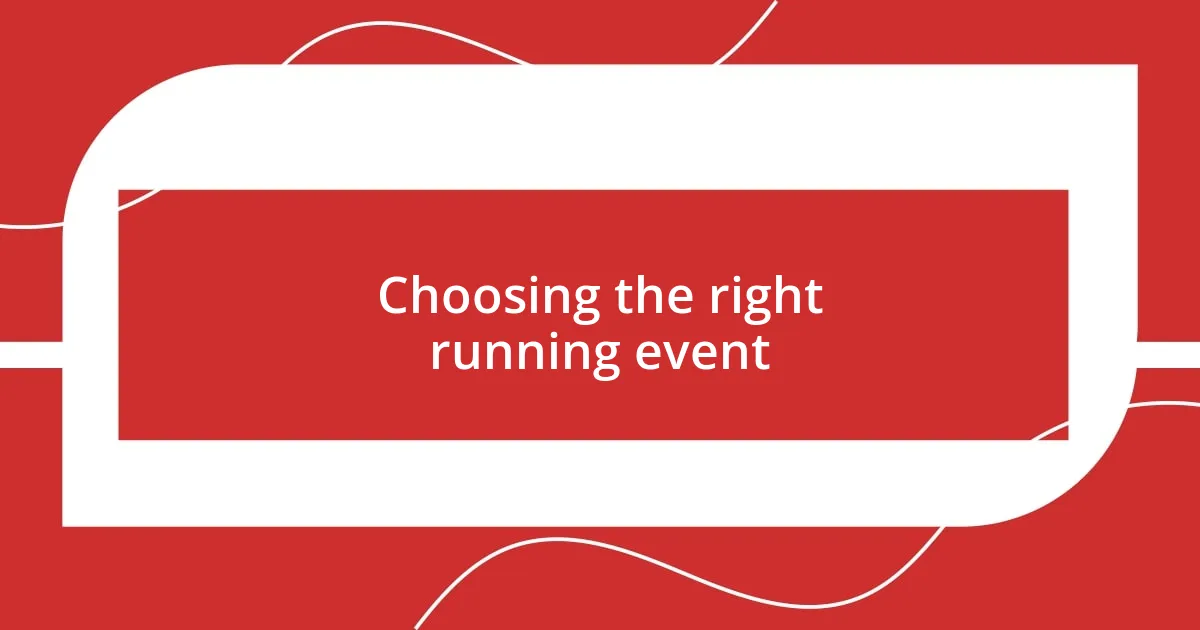
Choosing the right running event
Choosing the right running event can significantly influence your fundraising success. When I was selecting my first fundraiser, I considered not just the distance but also the type of event that would resonate with my community. A local 5K seemed perfect for my first run, as it attracted a diverse group and offered an approachable distance for many, encouraging higher participation. Sometimes, I think about how important it is to choose an event that aligns not just with your endurance level, but also with your fundraising goals.
It’s also crucial to consider the reputation and mission of the event itself. Some events, like marathons or endurance races, can attract seasoned runners, but not everyone is up for that challenge. I recall participating in a themed fun run where many dressed up, turning the race into a festive occasion. This added element of fun encouraged more people to join, and ultimately, it translated into higher donations. Events that engage the community authentically can really make a difference in both participation and fundraising efforts.
When looking at various events, I recommend evaluating factors like location, timing, and fundraising support offered by the event organizers. For instance, a well-organized event can provide tools and resources that simplify the fundraising process. In my experience, running in a well-promoted race often leads to more visibility for my cause. Just imagine standing at the start line, knowing that you not only have your fitness goals in check but are also part of a larger mission.
| Event Type | Considerations |
|---|---|
| 5K Fun Run | Great for families; more participants typically lead to better fundraising |
| Marathon | Targets dedicated runners; can be more challenging to attract participants, but strong fundraising potential |
| Virtual Run | Flexible participation; can engage a wider audience but may lack the community feel |
| Themed Runs | Encourages creativity and fun; often attracts less experienced runners |
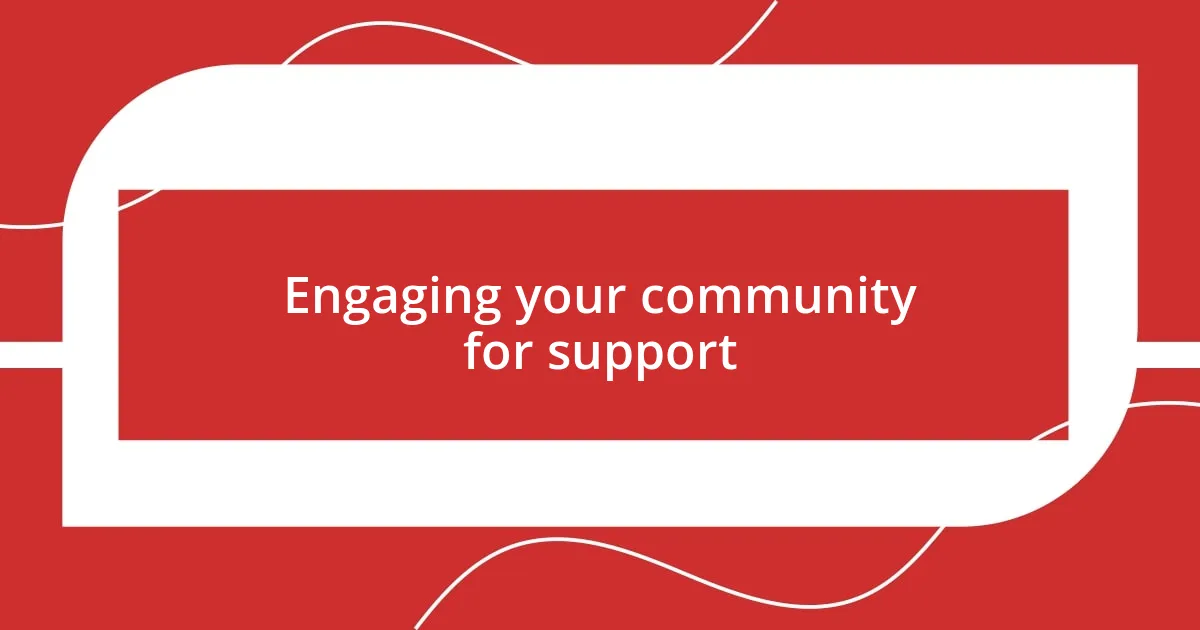
Engaging your community for support
Engaging your community for support is one of the most rewarding aspects of fundraising. When I organized my last charity run, I decided to reach out to local businesses to sponsor parts of the event. Imagine how exciting it was to walk into my favorite coffee shop and talk to the owner about my cause, only to have them donate gift cards for the runners! It created a sense of shared investment and allowed the community to feel directly involved in the fundraising efforts.
I believe that storytelling plays a vital role in fostering that community connection. Sharing why I’m running, the story behind my cause, and the impact it has made on people’s lives encourages others to rally around. I often ask myself, “What does this mean to me?” By opening up about my journey, I’ve seen friends and acquaintances start to share my message, amplifying my reach. It’s like planting seeds – the more personal my story, the more likely others are to join in and support.
Lastly, I’ve learned that leveraging social media can be incredibly effective in building community support. I remember posting about my training progress, and as I shared my struggles and triumphs, I noticed more friends engaging with my posts. Their encouragement made a difference in my motivation and helped to boost donations. How many times have you scrolled through social media and felt inspired by someone’s journey? Using these platforms can bridge physical distances, allowing community members to support each other and build excitement around your fundraising efforts.
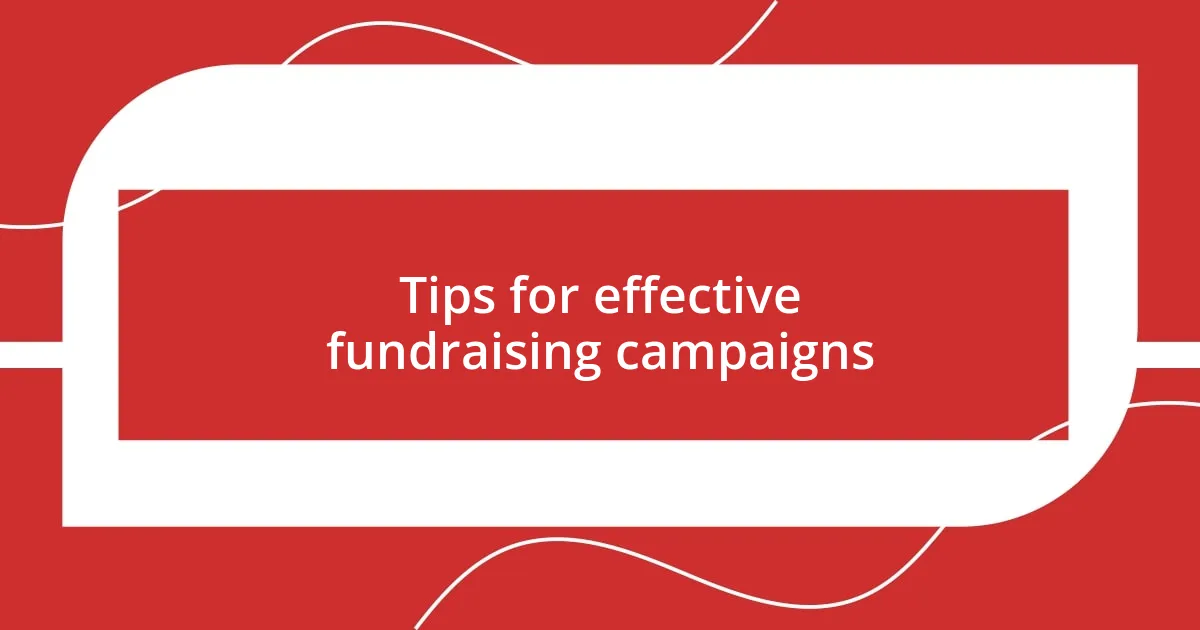
Tips for effective fundraising campaigns
One of my key tips for an effective fundraising campaign is to set clear, achievable goals. When I first started running for charity, I made the mistake of aiming high without a realistic plan. I’ve learned that breaking down your fundraising target into smaller milestones not only helps keep you motivated but also gives your supporters tangible goals to rally around. For instance, I announced my goal of raising $500 initially, and each time I hit a milestone, I celebrated it with my community. What’s more exciting than seeing progress together?
Another vital aspect is maintaining consistent communication with your supporters. I’ve found that sharing updates about my training and fundraising efforts creates a sense of involvement. During one campaign, I started sending weekly emails detailing my runs and encouraging donations with stories of the people we were helping. It made my supporters feel like they were part of the journey. Have you ever felt more connected to a cause when you hear directly from someone passionate about it? Keeping your audience informed fosters loyalty and enthusiasm for your campaign.
Finally, don’t underestimate the power of gratitude. Early on, I would solely focus on the fundraising aspect, forgetting to acknowledge those who were supporting me. I made it a habit to send personalized thank-you notes after each contribution, which not only made the donors feel appreciated but also laid the groundwork for future support. It’s incredible how a simple “thank you” can encourage someone to participate again. So, how are you showing appreciation for your supporters? Building these relationships is key in fundraising; it’s about creating a community that feels valued and motivated to contribute.
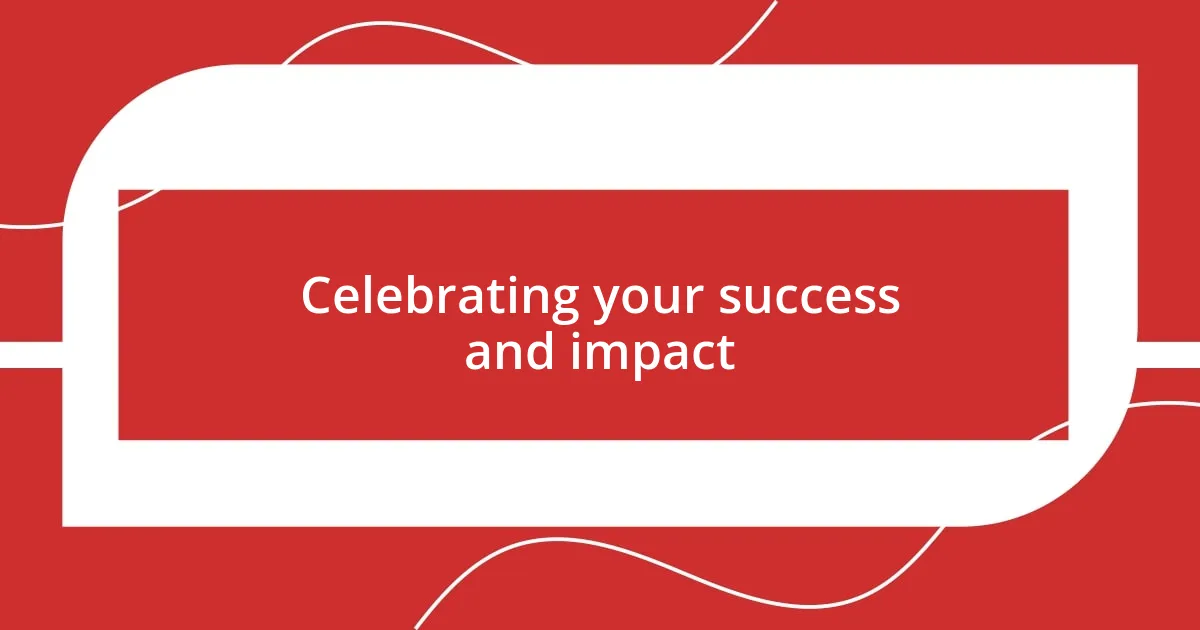
Celebrating your success and impact
Celebrating success in fundraising is not just about hitting your monetary goals; it’s about recognizing the journey you embark on. I remember crossing the finish line of my first charity run and feeling that rush of accomplishment—not just for myself, but for everyone who contributed. Reflecting on that moment, I felt a profound sense of connection with those who supported my cause. What greater joy is there than knowing your efforts have made a real difference?
One of the most impactful ways to celebrate is by sharing the stories of those who have benefited from the funds raised. I often find myself recalling a specific thank-you note from a beneficiary. Meeting someone whose life was changed because of our efforts brought everything full circle. What does it mean to you when you realize your hard work has a tangible impact on someone else’s life? I’ve learned that celebrating these stories, whether through social media, newsletters, or community events, can amplify the message and inspire others to keep supporting the cause.
When it comes to the celebration phase, I also believe in hosting events that bring everyone involved together. After a successful campaign recently, I organized a small gathering for supporters, where we could share our experiences and see the results of our hard work firsthand. The energy in the room was electric, filled with laughter and shared stories. How often do we take the time to revel in our achievements with those who helped us get there? It’s moments like these that create lasting memories and further strengthen our commitment to future endeavors.










